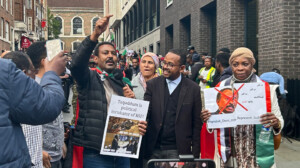Fuel and bread shortages cause disruptions in Sudan
Khartoum and several state capitals experienced severe fuel and bread shortages on Saturday and Sunday. This caused public transport disruptions, an increase of the cost of public transport, and limited transport of goods to the markets.
 Queuing for bread in Khartoum (file photo)
Queuing for bread in Khartoum (file photo)
Khartoum and several state capitals experienced severe fuel and bread shortages on Saturday and Sunday. This caused public transport disruptions, an increase of the cost of public transport, and limited transport of goods to the markets.
The fuel crisis caused long queues of vehicles in front of petrol stations in Khartoum. Many people were forced to walk to their work or to the market.
In Khartoum people demonstrated against the lack of bread, fuel and transportation on Saturday night. Both in Ed Damazin, capital of Blue Nile state, and in El Fula, capital of West Kordofan, long queues of vehicles lined up in front of petrol stations, and people were waiting in front of bakeries.
The Undersecretary of the Ministry of Energy and Mining, Hamid Suliman, announced that quotas of four gallons of fuel per vehicle per day will be distributed, starting Sunday.
The amount of flour distributed in the states has decreased, which exacerbated the bread crisis. A loaf of bread costs up to five Pounds on the black market in Sennar and El Gezira.
Last week, the price of a loaf of bread in El Gezira ranged from three to four Pounds. For comparison: in September 2019 people in Kassala complained that bread was sold “at the commercial price of two Pounds per piece”.
Distribution problems
People in Kosti in White Nile state demonstrated and closed roads yesterday, calling for a solution to the bread and fuel crisis. They also demanded that the governor of the state be sacked.
El Tayeb Mohamed, member of the Teachers’ Committee of the state, attributed the crisis to the control that elements of the former regime still have over the distribution of flour and fuel quotas in the state. He also claims White Nile state is in fact ruled by the security apparatus, which supported the ousted Al Bashir regime.
He said that the Ministry of Education suspended studies at basic and secondary schools for an indefinite period, except for students of the third level, because of the shortage of bread.
Minister of Industry and Trade Madani Abbas announced a breakthrough in the quotas of state subsidised bread after the flour mills committed themselves to provide 70,000 sacks of flour a day. After a meeting with the governor of Khartoum state yesterday, Abbas said there will be “a smooth flow of subsidised flour distributed through the mills”.
He stressed that the tightening of control means there will be sufficient quantities of flour available. He also announced that he will initiate laws “to reduce the leakage, smuggling and storage of strategic goods” such as grain.
Radio Dabanga’s editorial independence means that we can continue to provide factual updates about political developments to Sudanese and international actors, educate people about how to avoid outbreaks of infectious diseases, and provide a window to the world for those in all corners of Sudan. Support Radio Dabanga for as little as €2.50, the equivalent of a cup of coffee.












 and then
and then